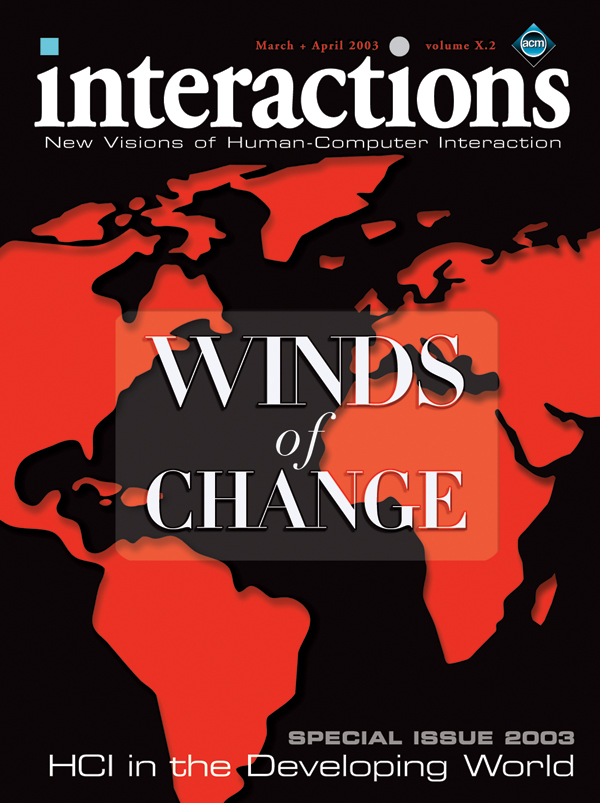Table of Contents
VOLUME X.2 March + April 2003
-
Editorial
-
Spanning the globe
Steven Pemberton
You may not be aware of it, but SIGCHI, the Special Interest Group in Computer Human Interaction, has grown incredibly in recent years: The number of local groups (Local SIGs as they are called) have risen from the first in Boston in 1986, to 15 in 1992, toand I…
-
-
Research alert
-
Undo as concurrent inverse in group editors
Chengzheng Sun
Undo is a standard feature in most single-user interactive applications. The user can use undo to recover from erroneous operations, to learn system features by trial and error, and to explore alternative solutions by backtracking. The availability of undo in multi-user collaborative applications is particularly valuable because: (1) features…
-
-
Whiteboard
-
Rainbow usability
Diane Norton
The March-April 2002 interactions Whiteboard column caught my eye. Focusing on usability terminology, the article declares that a product's intuitiveness depends on its users' previous life experience and learning. "Aha!" I thought. "This sounds like mental models." A user's mental model reflects her understanding of how something functions and…
-
-
Design
-
Personal digital historian
Chia Shen, Neal Lesh, Frédéric Vernier
One of the most enjoyable parts of life is sharing our experiences with others, whether with family over dinner, friends we see occasionally, relatives who live far away, people within our community, or colleagues we work with. People often use records of their past, such as photographs, videos, and…
-
-
HCI in the developing world
-
Indra’s Net
Susan Dray, David Siegel, Paula Kotzé
Introduction There is a legend that once, long ago, a net was thrown over all the peoples of the world. This net had bells sewn on at every junction, so that the movement of any person in any place would set the bells jingling, reminding all people of their…
-
Advancing UCD while facing challenges working from offshore
Pradeep Henry
India develops a substantial percentage of the world's software. Hundreds of software companies in India do software development work for various clients, including organizations in North America and Europe. Although it is accepted that Indian programmers are skilled, would users say that the best interfaces come from India? Hardly…
-
Using HCI to leverage communication technology
Gary Marsden
What is the benefit of human-computer interaction (HCI) to a developing country? On a continent where an estimated one in 130 people has access to a personal computer (PC) [3], surely interface design is an irrelevant luxury? On the contrary. Precisely because access to information and communication technology (ICT)…
-
Enabling computer interaction in the indigenous languages of South Africa
Laurette Pretorius, Sonja Bosch
Introduction Ubiquitous computing, the Web, and the ever-increasing processing power of computers have made the study of human-computer interaction (HCI) and the design of intelligent human-computer interfaces fields of crucial importance. If we further assume a human-centered approach to interface and systems design, then human preferences for modality of…
-
Cultures, literacy, and the web
Marion Walton, Vera Vukovic
When discussing how people get the "scent" of information on the Web, and thus how best to design for them, we seldom consider the role of literacy. Literacy, in its broadest sense, is not a neat parcel of skills easily packaged and given to someone. Anthropologists have found that…
-
Adopting information technology as a first step in design
Clarisse de Souza, Raquel Prates, Simone Barbosa
When the Information Society program (SocInfo [5]) was launched in December 1999, one challenge the Brazilian government posed to itself was to use information technology (IT) to foster wider social inclusion in Brazil. The other was to enable the Brazilian IT industry to compete in a globalized world in…
-
HCI in the so-called developing world
Derrick Cogburn
All around us, information, knowledge, and the use of networked computing continues to revolutionize how we live, work, and play. Although this perspective is obvious to many of us and in danger of becoming hackneyed, important structural changes are indeed occurring. Driven by social, political, economic, and technological factors,…
-
Human-computer interaction research and practice in China
Jian Wang
Computers and various communication devices are becoming an integral part of daily life for many Chinese. The number of PC, Internet, and mobile phone users has grown significantly in China in the past 10 years. In contrast to this explosive increase, human-computer interaction (HCI) research and practice in China,…
-
-
Fast forward
-
Universal, ubiquitous, user-interface design for the disabled and elderly
Aaron Marcus
Introduction How many of you have friends or relatives who are seriously disabled or elderly? Chances are you know someone or may be in frequent contact with someone in either category. In the HCI community, we often tend not to make either a center of study; we focus more…
-



